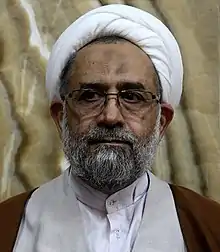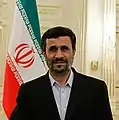Heydar Moslehi
Heydar Moslehi (born 1957 in Isfahan) is an Iranian cleric and politician who served as the minister of intelligence from 2009 to 2013.
Heydar Moslehi | |
|---|---|
 Heydar Moslehi in 2019 | |
| 7th Minister of Intelligence | |
| In office 3 September 2009 – 15 August 2013 | |
| President | Mahmoud Ahmadinejad |
| Preceded by | Mahmoud Ahmadinejad (Acting)[1] |
| Succeeded by | Mahmoud Alavi |
| Personal details | |
| Born | 1957 (age 65–66) Shahreza, Iran |
| Political party | Coalition of the Pleasant Scent of Servitude[2] |
| Military service | |
| Branch/service | Revolutionary Committee Revolutionary Guards |
| Years of service | 1979–2006[3] |
| Unit | Ground Force Basij Air Force |
Early life and education
Moslehi was born in Shahreza in the Isfahan province, Iran, in 1957.[4] He was a student of Haghani Circle and received a master's degree in International law after studying abroad for several years.
Career
Before Mahmoud Ahmadinejad was elected president in 2005, Moslehi served as the representative of Ayatollah Khamenei to the Basij. Then new president Ahmadinejad appointed him as his adviser for clerical affairs.[5] He was later appointed by Khamenei to be the head of the Organization for Islamic Endowments.[6]
Moslehi was originally appointed minister of intelligence on 5 August 2009. However, he resigned from his position on 17 April 2011 after being asked to resign by Ahmedinejad. The New York Times reported on speculation that Moslehi's resignation was prompted by a dispute with Esfandiar Rahim Mashaei, after Moslehi tried to dismiss an intelligence official.[7]
Moslehi was reinstated in his position by the supreme leader of Iran, Ali Khamenei. Ahmadinejad decided to not hold cabinet meetings in protest of Moslehi's presence.[8] As of April 2011, cabinet meetings were being held without Ahmadinejad, with the vice president of Iran, Mohammad-Reza Rahimi, chairing the meetings.[9] On 27 April, the parliament endorsed Moslehi in his position as minister of intelligence. Moslehi was sanctioned by both the United States (on 29 September 2010) and European Union (in October 2011).[10] The US sanctioned him due to his alleged connections in human rights abuses in the Evin prison.[10] The reason for the EU sanctions is his orders of the arbitrary detentions and persecution of opposition figures in the country.[10]
References
- Abbas Milani (3 August 2009). "Inside The Civil War That's Threatening The Iranian Regime". New Republic. Retrieved 3 June 2016.
- پایان حیات سیاسی جبهه متحد اصولگرایان
- "A Brief Biography of Iran's New Ministers". Payvand. 7 September 2009. Archived from the original on 10 July 2018. Retrieved 22 February 2013.
- "A Brief Biography of Iran's New Ministers". Payvand. 7 September 2009. Archived from the original on 10 July 2018. Retrieved 22 February 2013.
- Glenn, Louisa (1 September 2009). "Background brief: Ahmadinejad's cabinet". National Democratic Institute. Archived from the original on 8 July 2013. Retrieved 1 July 2013.
- Sahimi, Muhammad (20 August 2009). "Ahmadinejad's Security Cabinet". PBS. Retrieved 29 April 2011.
- Yong, William (23 April 2011). "Iranian Leader Asserts Power Over President". The New York Times. Retrieved 29 April 2011.
- Dehghan, Saeed Kamali (27 April 2011). "Iran's president and supreme leader in rift over minister's reinstatement". The Guardian. London. Retrieved 29 April 2011.
- "Iran: Cabinet convenes without Ahmadinejad for second time". Radio Zamaneh. 28 April 2011. Retrieved 29 April 2011.
- "Heydar Moslehi". Foundation of Defense for Democracies. Retrieved 17 February 2013.


